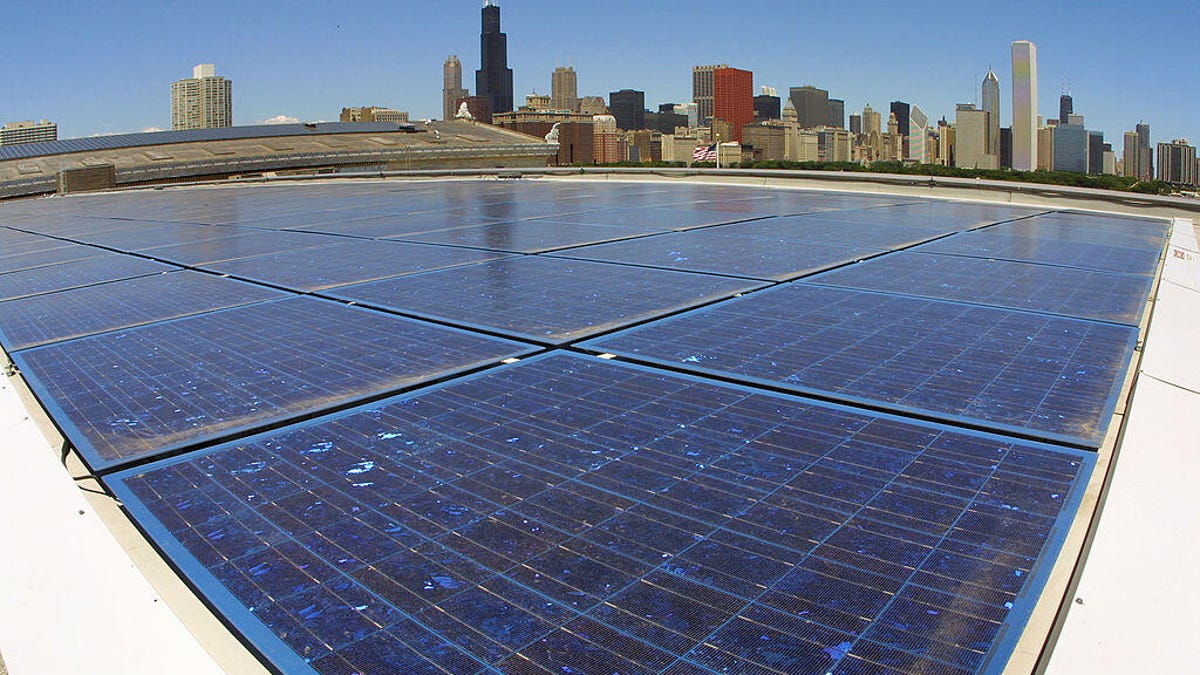Switching to solar is more lucrative than ever in Chicago. A decade ago, Chicago’s biggest utility provider had 7 megawatts of solar capacity, enough to power only about 388 homes. Now, ComEd has enough solar power capacity to drive power to nearly 46,000 homes. Illinois ranks No. 15 in the nation for solar capacity in 2024, according to the Solar Energy Industries Association.
“It’s a good time for people to move forward with solar,” said Marla Westerhold, who manages the My Green Power Connection team at ComEd. “There’s a lot of favorable legislation at the state level and federal level that you can stack. So go for it.”
The cost to the consumer is also much better today due to several federal and state-sponsored solar incentives. This has improved solar adoption in the Windy City and across Illinois. The federal residential clean energy tax credit grants you a 30% rebate on the cost of your solar panel system. On top of that, there are common state-level incentives like net metering. The Land of Lincoln offers special programs like Illinois Shines, granting you benefits you’ll scarcely see elsewhere.
If you’re looking to install solar panels on your rooftop, here’s a look at some of the best companies in Chicago and the incentives that can help you save money on the cost of installation.
Best national solar panel companies in Chicago
Palmetto Solar
Best overall
Solar panels are typically low maintenance equipment, but they’re also unfamiliar. If you want to reap the benefits of solar but will have a bit more peace of mind if someone else is making sure it’s working, Palmetto might be a good fit for you. Just remember to add the cost of Palmetto’s monitoring service in to your payback period calculations.
EnergyPal
Most flexible
EnergyPal is more than just a middleman. It’ll handle your solar installation from beginning to end while also allowing you to benefit from its proprietary engine and competitive bidding process. The company offers a range of hardware for panels, batteries and inverters, has plentiful financing options and offers responsive customer service support.
Freedom Forever
Best for cash customers
Include Freedom Forever in your search if you want the backing of a national company that installs a wide variety of the most popular solar equipment available. Freedom Forever also extends a couple of products that take some of the pain and risk out of going solar, like a production guarantee and an escrow option with cash purchases. Online reviews say customer satisfaction has been low of late, though the company says that’s changing.
Tesla Solar
Most affordable
Tesla’s solar branch seems to be the least loved of Elon Musk’s ventures. Even Tesla’s Solar Roof seems to get more love.
If price is the thing you won’t budge on, consider Tesla. By all accounts, Tesla installs quality panels and makes the closest thing there is to a household name in solar storage: the Powerwall.
Where you might miss out is customer service. Discussion online seems to suggest Tesla’s service is a bit of a gamble.
Local solar panel installers in Chicago
Tron Solar was founded in 2018 in Vernon Hills, Illinois, and has since installed more than 800 solar projects in the area. The company services 11 states and received a grade of A+ from the Better Business Bureau
Tron offers a 10-year full-service warranty, a 25-year manufacturer’s warranty and a 10-year roof warranty. Like most solar companies, you can use a mobile app to monitor your system’s production in real-time.
How to determine which solar company is best for me
Rooftop solar installations are now a fairly standard project, but each project will have differences. What works on one roof will need to change a bit before being applied to the roof next door. That means that you’ll want to find the installer that best fits your needs, which might be different from the companies identified above.
The most reliable way to find the best solar installer for you is to research and interview a few. You should check out online reviews on third-party platforms and talk to neighbors and friends who have installed solar. Then, when you’ve chosen a few installers to talk to, make sure they answer all of your questions clearly and completely.
Ask installers for their certification — the North American Board of Certified Energy Practitioners is one common certifier — and their experience with roofs like yours. Also, ask about their experience working with your utility, which will need to give permission for your system to operate, and their experience with your local government, which will issue the necessary permits.
Solar installers should be transparent about the price and schedule of your project upfront and they should be price-competitive. Always get multiple quotes from reputable companies. Because prices vary between markets, the best way to make sure you’re getting a decent deal is to compare real estimates for projects on your roof.
Read the contracts to understand what you’re paying for. “Will you own the panels, or is it a lease or power purchase agreement?” Westerhold said. “A lot of companies have marketing that is potentially deceptive.”
In Chicago, Westerhold said, you can call ComEd’s My Green Power Connection team, which can help you evaluate bids and get advice. Try to get customer referrals for any company you’re working with. You can also check the Better Business Bureau and the Illinois Commerce Connection website and look for complaints against the installation companies you’re comparing.
Cost of solar panels in Chicago
In Chicago, a standard ComEd customer pays around $23,000 to install a solar panel system, according to Scott Vogt, the vice president of strategy and energy policy at ComEd. The average customer receives $17,900 back using federal, state and utility incentives. They’ll need to finance the remaining $5,100. Low-income customers pay around $21,000 for a solar array and may receive 100% of that back through incentives.
Your cost may vary based on:
- The size of your solar array.
- The pitch of your roof.
- Type of solar panels you purchase.
- Whether you get a battery system.
- The tax credits, payment programs and rebates you receive.
Here’s a look at the average cash price for a typical solar panel system in Illinois before factoring in tax credits and incentives, according to FindEnergy.com.
Average cost of solar panels in Illinois
| Typical system size (kW) | Price per watt | Total installed cost | Cost after 30% federal tax credit | |
| Illinois | 6 | $3.76 | $22,560 | $15,792 |
| National average | 5 | $3.56 | $17,800 | $12,460 |
Below, you’ll find an infographic we put together that shows the average total cash price, cost per watt and typical system size for a solar panel system in your state, according to data from FindEnergy.com. The prices we display aren’t factoring in tax credits or state incentives. Certain states don’t have any FindEnergy solar data and are grayed out on the map.
Chicago solar panel incentives and rebates
Solar panels are getting more affordable every year, but they can still cost tens of thousands of dollars. Chicago residents have many ways to save when going solar.
For instance, the federal residential clean energy credit will cover up to 30% of the cost of qualified clean energy improvements to your home, and statewide programs like Illinois Shines and Illinois Solar For All may cover some or all of the remaining balance. Illinois also allows property tax adjustments, so you won’t pay a higher tax bill just for installing solar panels. Utility programs like net metering and solar appliance rebates can also help you save. Here’s a rundown of programs you can access in Chicago:
Chicago solar incentives
| Solar incentive | Description |
|---|---|
| Residential clean energy credit | This federal tax credit reimburses you for 30% of the cost of solar panels, installation costs, panel-related electrical work and permit fees. |
| Solar property tax adjustment | Solar panels often increase the value of your home. In Illinois, you can have your house assessed with your solar system and as if it had a conventional heating and cooling system instead and pay taxes on the lower assessment. |
| Commonwealth Edison Co. (ComEd) Distributed Generation Rebate | ComEd utility customers can get a rebate of $300 per kilowatt when they install solar panels and an energy storage device. |
| Illinois Shines | This statewide program will pay you upfront for the future value of your renewable energy credits. |
| Illinois Solar for All | This statewide program can either provide low-cost community solar or cover all of the upfront costs of a solar system for low-income residents. |
| Net metering | This process allows you to sell excess solar energy back to the utility. Systems installed in 2024 and before receive credit for the full retail cost of electricity. Systems installed in 2025 and later will receive credit only for the supply cost of electricity, but not the delivery cost, meaning the return will be somewhat below one-to-one. |
| Chicago’s Green Building Permit Program | This citywide program streamlines the permit process and lowers the costs associated with installing solar panels. |
| Solar group buy programs | These programs provide group discounts on solar panels. |
How solar-friendly is your state?
CNET recently ranked states based on their residential solar policies: the laws and regulations affecting consumer-level solar panel installation and adoption. These policies play a major role in determining how accessible and affordable a solar panel system is to the average resident.
Each state was evaluated through a methodology and scored based on eight categories. The final score was converted to a letter grade.
Here’s how your state scored on CNET’s solar policy test.
Illinois
Grade: B
Incentives available:
- The Illinois Solar For All and Illinois Shines programs subsidize installation costs
- Retail rate net metering
- Solar panel systems fully exempt from property taxes
- Statewide low-income rooftop solar and community solar programs
Strongest scoring categories:
The Prairie State has a multitude of programs designed to lower solar panel installation costs. Retail rate net metering and a full property tax exemption also help lower the solar payback period for those installing solar in the state.
Categories to improve:
The state doesn’t exempt solar equipment from sales tax. The state could also mandate community solar capacity to ensure more low-income households have an affordable path to solar energy.
How to pay for solar panels in Chicago
Like most large expenses, you can pay for solar panels in a variety of ways. Before you commit to buying panels for your home, research how to pay for them. Whether you’re using your savings, taking out a loan or going with the preferred method for your installer, here are the options you can expect:
- Cash: Paying for the panels upfront could be the cheapest option because you won’t pay interest and fees. The drawback is that you’ll be taking money away from other financial goals.
- Solar loan: Many solar companies offer solar loans. This can be a simple and convenient option, especially if you get financing from the company that installed your solar panels.
- Other types of loans: You can also get a personal loan or a home equity line of credit from a bank or credit union, which might offer lower interest rates and better loan terms. This could be a good option if your installer doesn’t offer solar loans and you don’t have the cash to pay for the panels upfront. Just be aware of the risks of borrowing against your home equity — you could lose your home if you fail to pay it back.
- Lease or power purchase agreement: It’s also possible to lease your solar panels, where a third-party company installs the panels and then charges you a monthly fee to lease them. This typically costs more in the long run. A power purchase agreement is similar, but you’ll buy power from the solar company on a per-kilowatt-hour basis, as you would from the power company.
Installation factors to keep in mind
Before you reach out to a panel installer, it’s a good idea to evaluate your home and figure out if it’s a good candidate for a solar system. Your utility company is a good place to start, Westerhold said.
The utility may be able to help you evaluate the roof, determine if you qualify for solar incentives and explain your financing options.
Here are some of the factors you’ll need to consider:
- Roof conditions. Before you install the panels, a professional should check your roof and make sure there are no leakages or other problems.
- Homeowners association rules. A state law in Illinois says HOAs can’t ban solar installations — but they can adjust their placement in some cases.
- Your tax bill. Illinois allows property tax adjustments, so you won’t pay a higher tax bill if the value of your home increases after installing solar panels.
- Homeowners insurance. You’ll need to let your insurance company know you’ve installed solar panels. Your rates may increase.
- Sunlight and tree cover. Solar panels work in cold weather, but they’ll need to be installed under direct sunlight. If your roof is covered by too much shade, you might be a good candidate for community solar.
- Whether you own or rent your home. If you rent, you may need your landlord’s permission to install panels. And keep in mind, you might need to own your home to qualify for some solar incentives.
- Energy requirements of your property. A panel installer can help you figure out how many solar panels you need, but there are ways to estimate your costs ahead of time.
How we found the best solar companies
The companies we listed above as “the best” are curated from CNET’s best solar companies list. Companies making the best list are scored on the equipment, warranties and customer service they offer. Then, we make sure these recommendations are available in your state. You can read a full breakdown of how we review solar companies here.
Companies listed under the local installers were chosen in a less rigorous way. We chose them because they offered something unique or notable to customers in the state, they seemed well-regarded by internet reviewers or because they were one of the few installers we could find information on in the state.
Whether we’ve completed a full review on a company or not, it’s always a good idea to get multiple quotes from different installers before choosing a company.
Show more
Frequently asked questions
What are the advantages of solar panels?
Solar panels can help you become 100% energy-independent or live off the grid. In Chicago, which allows net metering, you can sell any excess solar energy back to the grid. This will help you save money and potentially earn a bit extra too. If your roof isn’t a good candidate for solar panels you may consider subscribing to a community solar program.
Show more
Are solar panels worth it in Chicago?
Yes, solar panels can be a worthwhile investment for many residents in the Chicago area. You can use ComEd’s solar calculator to check whether your property is a good candidate for panels. The calculator checks the direction of your house, the pitch of the roof and shading on your property. It can also help you find rebates and other incentives to reduce the costs of those panels.
Show more
How long does it take to pay off solar panels?
In the Chicago area, it takes the average ComEd customer around five to six years to recoup the costs of solar panels through their monthly energy savings, Vogt said. A low-income customer can recoup their costs in about 15 months.
Show more








